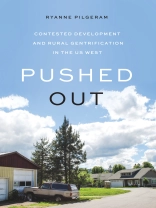A small town weighs the economic compromises of growth in the Rocky Mountain West
What happens to rural communities when their traditional economic base collapses? When new money comes in, who gets left behind? Pushed Out offers a rich portrait of Dover, Idaho, whose transformation from “thriving timber mill town” to “economically depressed small town” to “trendy second-home location” over the past four decades embodies the story and challenges of many other rural communities.
Sociologist Ryanne Pilgeram explores the structural forces driving rural gentrification and examines how social and environmental inequality are written onto these landscapes. Based on in-depth interviews and archival data, she grounds this highly readable ethnography in a long view of the region that takes account of geological history, settler colonialism, and histories of power and exploitation within capitalism. Pilgeram’s analysis reveals the processes and mechanisms that make such communities vulnerable to gentrification and points the way to a radical justice that prioritizes the economic, social, and environmental sustainability necessary to restore these communities.
About the author
Pilgeram is associate professor of sociology at the University of Idaho. Pilgeram has published in journals such Society & Natural Resources, Rural Sociology, Gender, Work, and Organizations, and Sociology Compass. She is coeditor of Teaching Gender and Sex in Contemporary America (Springer, 2016).












